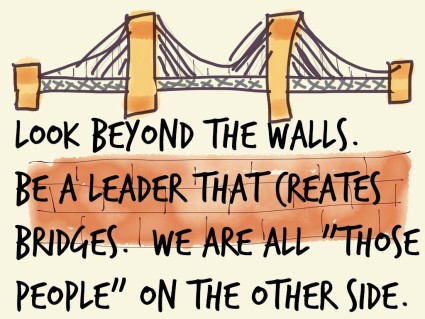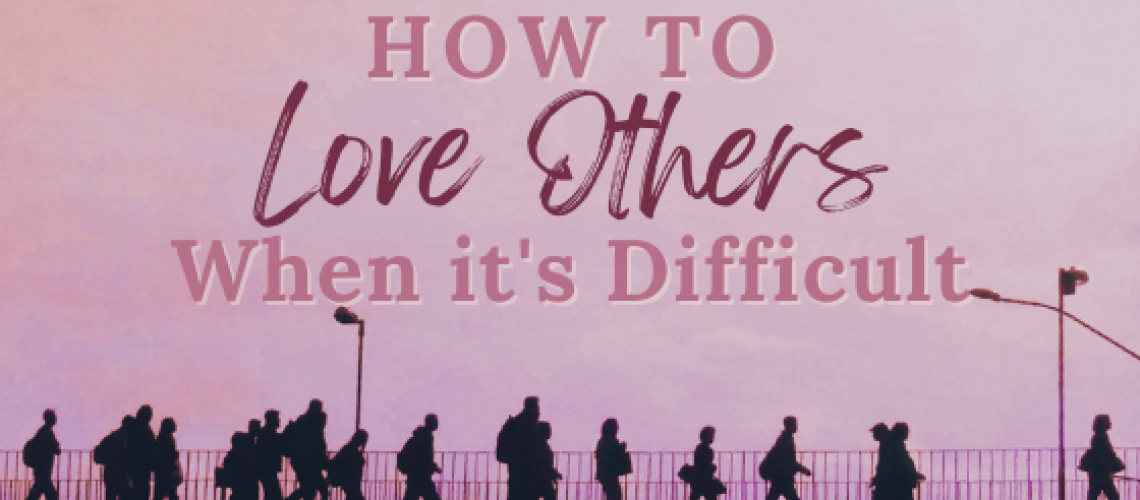It’s interesting to think about the boundaries that exist all around us. There are many necessary reasons why houses have walls. Fences take their place around almost all back yards. Housing complexes have gates. Within houses, there are rooms. We can make a much longer list than this.
How can we speak to the purpose of these boundaries in a way that is unifying? It may be that the way we see the physical boundaries around us will translate to how we create and establish boundaries with others.
I can see the walls of my house in a variety of ways. I can be grateful that I am protected from unforeseen circumstances like weather and intruders. This gives me peace and comfort. However, if I take it a step further, I could see my walls as the means to keep out all the unknown that can disturb me. I will stay here and you stay there. It’s comfortable this way. I can decide that my walls are up to keep you out. Or, I could let my walls create more than separation.
I can be grateful that I have windows and doors that allow for light to be invited in, people to be welcomed in, and for me to leave and engage with my neighbors and the rest of my community. Maybe I see my walls as providing the space that my neighbors need from my noise and belongings. I have walls so that you can have your own space.
Walls can also allow me to share the space given to me. I can look outside and find joy in considering who to invite into a comfortable space where they are taken care of. I can provide the food, water, shelter, and entertainment for a time, freeing my guests from that burden. The walls of my house can simply define the space that’s mine, or it can remind me of what’s in my care. I don’t own what’s in these walls to bring meaning to my life. I have been gifted the space within these walls so that my life is cared for, leading me to be able to care for others.
What about the intangible boundaries we put up between ourselves and others? How can we see these boundaries in a similar way?
Boundaries can be established in many ways for different reasons. Some boundaries are naturally there. You can see distance or unfamiliarity as a solid wall between you and an entire group of people. You can see a lack of interaction or acquaintance as a wall. Some walls are established because you can perceive that there is danger associated with a certain group of people or a particular person. Some boundaries go up because there needs to be distance and it’s the healthiest thing for everyone involved. What we’ll focus on here are the boundaries we establish, on our own, that are rooted in fear of the unknown.
You can choose to remain close to home, interacting primarily with the people you know and trust. You can decide that people who are most like you are the ones who you should give your time to. You can say to yourself that you can’t make time for those who are over there…who think a certain way, do certain things, or believe certain things. You can say these things because making time requires a type of effort you don’t want to make, and a risk you don’t want to take. You may not be making effort or taking risks, but you may be making a statement about how you see those people over there. Maybe you’ve broadly decided that a boundary should be established between you and all those people. By deciding this, you make the statement that each one should remain separated from you.
It is often decided that different should mean separate. Sometimes this is a conscious decision and sometimes having a narrow focus ends up separating you from the wider world. Being with familiar people becomes comfortable and simple. There’s a rhythm around how you spend your time and who you spend it with, and you like the sound of that rhythm. It keeps things calm and peaceful. It’s a familiar rhythm by which you can move about freely within the comfort of your own walls. It’s predictable and organized. Being disorganized and unpredictable would disturb the rhythm. It may even disturb you.
What would happen if the walls that kept us safe took on a different purpose?
It might be that having the courage to make effort, instead of reinforcing boundaries, could lead to a beautiful meeting. It could mean that the boundary becomes a meeting place. Going to the edge of your own margins could create connection. Stretching out as far as you can go could create growth. Venturing into what you assume is unknown territory could make new things known. A new place could end up being more familiar than the space inside your own walls. You could find a significant part of yourself in a new place…in a new person.
If I meet you where you are, regardless of who you are, then my walls become doors. My space grows wider and becomes open when I don’t limit myself to the space I know. I become new when I don’t limit myself to the person I’ve decided I am. New people that seem to be over there are often the ones that give us the peace and comfort of a connected world. We are deceived to think this peace comes from staying close to who and what is known. But true peace comes from love, not fear, of the unknown.
True peace comes from allowing our differences to bring us together. A true safe space allows each person the freedom to be who they are, to be courageous, and venture into the unknown. The safety of your own walls exists as a lie to keep you from stretching your boundaries. When boundaries stretch, people stretch. When people stretch, people become new. When people become new, divisions become old. My newness brings me to the place where I meet you. When I see it this way, my boundaries show me where you are. I no longer close my eyes to you and allow you to be over there, beyond the walls of my house. But I see you through the windows and invite you in through the open door.
-Katrina Bitar, YES Program Director





